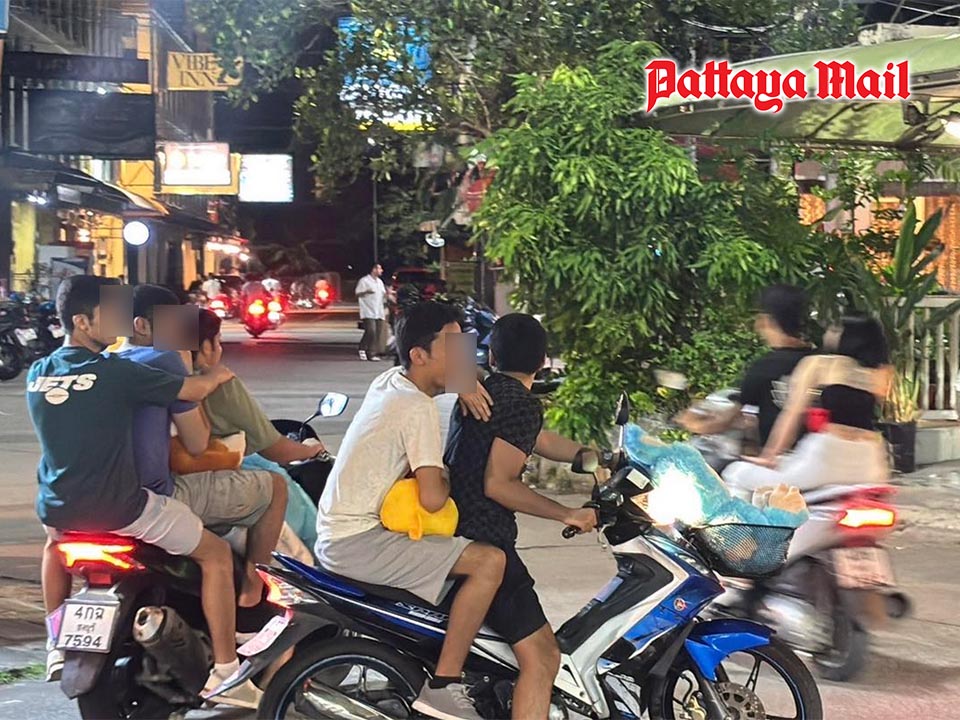Why Kuwaiti tourists repeatedly break Pattaya’s traffic laws despite enforcement efforts
Residents complain as noisy, reckless motorbike gangs return — with little lasting impact.
PATTAYA, Thailand – Every mid-year holiday season, a familiar and frustrating pattern unfolds in Pattaya: groups of Kuwaiti and other Arab-speaking tourists flood the city, bringing with them noise, reckless driving, and blatant disregard for Thai traffic laws. Despite nightly police checkpoints and widespread social media complaints, the problem persists year after year. Residents are now asking: why? “Every year, same chaos – and the police just let it happen,” one frustrated local said.
On the night of July 10, Pattaya police responded to numerous complaints from residents in Soi Yensabai about loud, speeding motorbikes revving until dawn. Led by Pol. Lt. Col. Suchart Dudsadee, officers set up a checkpoint, seizing several modified bikes and issuing warnings to dozens of violators. Some riders tested positive for drugs, and one venue was found operating illegally – again.
But many locals say these efforts are too little, too late. “They get caught, pay fines, then do it again the next night — same noise, same streets,” one resident posted on Facebook. “Last year they even surrounded a group of cops – and still got away,” recalled another commenter.
Pattaya police seize bikes and issue warnings, but locals say enforcement is too soft.
Loopholes, Leniency, and Lack of Deterrents?
Many believe weak enforcement and an overly tolerant system lie at the heart of the problem. Offenders often face only small fines or warnings before being released. Meanwhile, police appear more focused on stopping foreign tourists wearing helmets than tackling the real issues: modified bikes, unlicensed riders, and outright lawlessness. “Helmeted foreigners get stopped. Thai riders with loud exhausts and no mirrors? They just ride past,” a Pattaya resident said, criticizing selective enforcement.
Calls are growing for stricter laws targeting both riders and rental shops. Many argue that shops should be penalized for renting bikes to tourists without proper licenses, and that repeat offenders should face deportation and bans on returning. “It’s not fun anymore. It’s disrespect,” said a Thai man. “Send them home. Let them drive like that in their own country.”
Are the Police Doing Enough?
Police presence has visibly increased recently, with nightly checkpoints on key roads like Thappraya, Jomtien Beach, Second Road, and Pratumnak. Vehicles have been seized, fines imposed, and violators detained. Yet critics say the approach is reactive and short-lived. “If they were serious, we wouldn’t see the same chaos every year,” said a long-time expat. Locals want to enjoy Thailand — not be woken up by revving engines at 3 a.m.”
Frustrated citizens urge the government to fine rental shops and expel repeat offenders.
The Visa Dilemma
The spike in noise and reckless behavior coincides with Thailand’s visa exemption for Kuwaiti citizens – a policy many locals now question. While most Kuwaiti visitors come to enjoy leisure and spend money, a subset treats Pattaya as a lawless playground. “Free visa, no respect,” a local woman wrote. “Why should we tolerate this every July?”
Some suggest harsher penalties – passport confiscation, forced deportation, or public blacklists—are needed to show that Thailand’s traffic laws apply equally to all visitors, regardless of nationality or wealth. However, critics warn such measures could strain diplomatic ties or damage Thailand’s image as a welcoming tourist destination.
If crackdowns grow too severe, officials must be ready for backlash: complaints, diplomatic protests, and possibly fewer tourists. For some, the allure of Thailand’s laid-back reputation is part of the draw — and a harsher crackdown could shatter that illusion.
Tourists arrive; bikes scream through streets; locals lose sleep and faith in the system.



